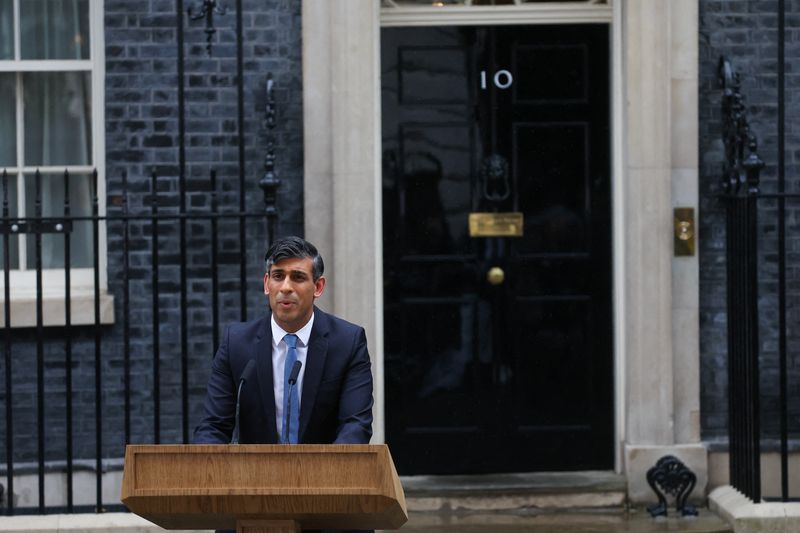By Elizabeth Piper, Andrew MacAskill and William James
LONDON (Reuters) - British Prime Minister Rishi Sunak called a national election on Wednesday for July 4, saying Britons would be able to choose their future in a vote his Conservatives are widely expected to lose to the opposition Labour Party after 14 years in power.
Ending months of speculation as to when he would call a new vote, Sunak, 44, stood outside his Downing Street office in pouring rain and called the election several months earlier than expected - a risky strategy with his party far behind Labour in the opinion polls.
Almost shouting to be heard above an anthem of Labour's election victory in 1997 under former prime minister Tony Blair being played by protesters outside Downing Street's gates, Sunak listed what he said were his achievements in government, not only as prime minister but also as a former finance minister.
"Now is the moment for Britain to choose its future and decide whether it wants to build on the progress we have made or risk going back to square one and no certainty," he said.
"Over the next few weeks, I will fight for every vote, I will earn your trust and I will prove to you that only a Conservative government led by me will not put our hard earned economic stability at risk."
He accused Labour leader Keir Starmer, conversely, of always taking the "easy way out" and of having no plan. "As a result, the future can only be uncertain with them," he said.
Starmer, who has pulled Labour to the political centre ground after it had veered leftwards, responded with a statement that focused on one word: "change".
"On July 4 you (voters) have the choice and together we can stop the chaos, we can turn the page, we can start to rebuild Britain and change our country," he said, in front of two Union Jack flags.
SUNAK TRAILING
Sunak heads into the election not only trailing far behind Labour in the opinion polls but also somewhat isolated from some in his party, increasingly dependent on a small team of advisers to steer him through what is set to be an ugly campaign.
But he seems to have decided that, with some economic gains such as falling inflation and an economy growing at its fastest pace in almost three years, now is the time to take a risk and present his agenda for a new term formally to voters.
"Labour want you to think that this election is over before it has even begun," Sunak told a rally, hosted in an east London exhibition centre and attended by senior ministers and supporters, hours after the formal election announcement.
"The British people are going to show Labour that they don't take too kindly to being taken for granted."
Several in his party said Sunak might also have realised that legal challenges could jeopardise a flagship scheme to send illegal asylum seekers to Rwanda and that the government might not be able to deliver on any more tax cuts as promised.
Conservative lawmakers, speaking on condition of anonymity, said economic conditions may worsen, meaning the time was right for an election, but others were shocked by the decision to bring it forward from an expected autumn date. The vote has to be held before the end of January next year.
"It was good while it lasted," said one of them.
A former investment banker and finance minister, Sunak took office less than two years ago, and since then has struggled to define what he stands for, becoming increasingly frustrated that what he sees as his successes have failed to be appreciated.
Sunak has tried several times to turn around his party's fortunes by recasting himself as a bold reformer, then as an effective technocrat and, most recently, as someone who will "stick to the plan" to gradually improve lives in Britain, where millions are still struggling with the cost of living crisis.
Both parties have all but kicked off campaigning for an election, with the attack lines on the economy and on defence already firmly drawn.
Sunak and his government accuse Labour of being poised to increase taxes if in government and that the party would not be a safe pair of hands for Britain in an increasingly dangerous world as it lacks a plan, charges the opposition denies.
Labour accuses the government of 14 years of economic mismanagement, leaving people worse off, with a series of chaotic administrations that have failed to give the stability businesses have craved to spur economic growth.
If Labour, which is running about 20 percentage points ahead of the Conservatives, win the election, Britain, once known for its political stability, will have had six prime ministers in eight years for the first time since the 1830s.
CHALLENGE
Despite Labour's lead, some party officials are concerned their advantage is not as solid as it appears, fearing many voters remain undecided. They also know the challenge: the party needs a record swing in votes to win a parliamentary majority.
Labour has yet to complete the selection of all its parliamentary candidates, a party veteran said.

Sunak might be hoping the first flights in the scheme to send illegal asylum seekers to Rwanda could boost his party's fortunes. The earliest possible date for those flights is June 24, 10 days before the election.
If they don't take off, one Conservative lawmaker said, Sunak could then blame "leftist lawyers".